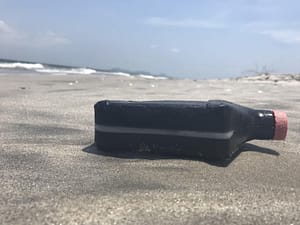Another blow for plastic collection in the Pacific Ocean
The pioneers at Ocean Cleanup were really disappointed when they had to abort their first plastic collection mission on December 29. last year. The 600 … Read more
The pioneers at Ocean Cleanup were really disappointed when they had to abort their first plastic collection mission on December 29. last year. The 600 … Read more
A threat or a danger is usually something the human body ether see, hear or smell. Your nerve system tells you to protect yourself to … Read more
When you read about plastic pollution in the ocean you will most likely come across the figure 8 million tons. Where does this come from? … Read more
Do your friends know that...
In 2021, more than 12,000 wind-turbine blades were scrapped globally. In 2030 the number is expected to exceed 28,000. Burning them in cement-factory kilns instead of sending them to landfill reduces emissions overall.
That the lifetime cost to society, the environment and the economy of plastic produced in 2019 alone was US$3.7 trillion - more than the GDP of India - and unless action is taken, this cost is set to double for the plastic produced in 2040.
Global plastic production will almost triple by 2060. Globally, plastic leakage to the environment is seen doubling to 44 Mt a year, while the build-up of plastics in lakes, rivers and oceans will more than triple, as plastic waste balloons from 353 Mt in 2019 to 1,014 Mt in 2060.
Recycle plastics into their products before it enters the oceans. In 2021, the NextWave consortium prevented 959 metric tons from ever entering the ocean and made 337 premium products out of it – keeping the equivalent of over 257 million water bottles out of the ocean.
The EU approved in 2019 a ban on single use plastic from 2021. Other countries followed. Three years later, EU wants to ban mini-shampoo bottles in hotels and the use of throwaway cups in cafes and restaurants. France banned use of plastics to package most fruit and vegetables in 2022 and in the food industry.
The effects of recycling will be limited even with economic and environmental incentives. Sorting plastics before it is recycled is costly and time consuming. It is energy intensive and the end product has low quality. Today’s technology does not effectively manage all the different types of plastics.

